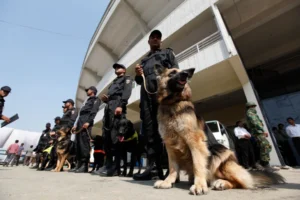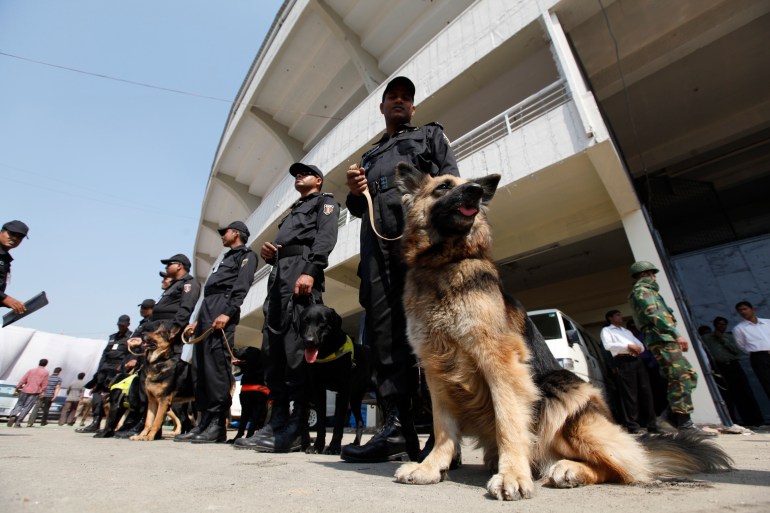Despite being accused of forced disappearances and extrajudicial killings, the notorious Rapid Action Battalion was hosted in Poland and the Netherlands.


One day after Al Jazeera’s Investigative Unit (I-Unit) reported on Bangladesh’s notorious Rapid Action Battalion (RAB) receiving cybersecurity and surveillance training in the UK, it can reveal that nine of its members also received goods and training in at least two European Union countries in 2022.
The RAB as an organisation and seven individuals currently or formerly working for it were sanctioned in December 2021 by the United States under the Global Magnitsky Act for their alleged involvement in human rights abuses.
KEEP READING
list of 4 items
Notorious Bangladesh police unit received spy training in the UK
UK refusal to sanction Bangladesh ‘death squad’ revealed
Documents reveal discrimination and racism in UK Labour Party
What really happened during Labour’s ‘anti-Semitism crisis’
end of list
The following year, nine members of the RAB, including one of the seven individuals sanctioned by the US, received training or other services in the Netherlands and Poland.
Since 2010, human rights groups have written extensively about the RAB’s alleged human rights abuses, which range from forced disappearances to extrajudicial killings and arbitrary arrests.
“We are concerned that these governments are perhaps enabling the abuses that RAB has already been accused of and been found responsible for,” Human Rights Watch (HRW) Southeast Asia Director Meenakshi Ganguly told Al Jazeera.
“What these documents suggest is that the RAB has been travelling around the world acquiring equipment and receiving training.”
When the US sanctioned the RAB and seven current and former high-ranking RAB officials in 2021, it cited evidence that the organisation was involved in at least 600 forced disappearances since 2009 and more than 600 extrajudicial killings since 2018.
Foreign intelligence training
In March 2022, RAB officers travelled to Poland, where they received foreign intelligence training, according to documents and statements obtained by Al Jazeera.
Among them was RAB Additional Director General Khan Mohammad Azad, one of the seven people sanctioned by the US.
The training in Poland was provided by a company called European Security Academy (ESA), which offers training to military personnel, law enforcement organisations and private military companies.
It was the second time in three years the RAB canine squad travelled to the Netherlands for such an inspection.
According to RAB documents obtained by Al Jazeera, the Polish and Dutch governments were forwarded copies of the travel notices by the RAB.
Magnitsky Act sanctions
Under the US’s Global Magnitsky Human Rights Accountability Act, which was created to penalise human rights abusers, US assets owned by a sanctioned person or organisation are frozen and US companies and individuals are prohibited from doing business with them.
According to Amanda Strayer, supervising staff lawyer for accountability with US-based human rights organisation Human Rights First, RAB officers travelling to Europe shows why allies need to work together when it comes to sanctions against human rights abusers.
“We’re talking about them going to Europe to get training to get better at what they do,” Strayer told Al Jazeera.
“The UK, the European Union, Canada, they all have very similar style global Magnitsky sanctions programs. They all have the capacity to sanction the Rapid Action Battalion and to sanction those senior officers.”
But, Strayer said, implementing those types of sanctions is especially hard for the EU because it’s such a large multilateral organisation.
“EU consensus is not something that comes easily and maybe that’s one of the reasons that RAB felt: ‘We should go here because it’s going to be much more likely for us to get away with it,’” she said.
More than 25 trips to Europe
Additional data collected by the I-Unit reveals that RAB officers have travelled to Europe more than 25 times since 2017. Some of those trips were to receive training on using mass surveillance equipment and others were for pre-shipment inspections of equipment.
In 2017, its then-leader Benazir Ahmed, who is one of the individuals sanctioned by the US, was a speaker at a police conference in Germany.
RAB members also travelled to China, Russia, Thailand, Turkey, and the United Arab Emirates during that period.
All these trips took place despite human rights groups having reported for years on the RAB’s human rights abuses, with reports of abuse by the group’s members going back more than 10 years.
The force, founded in 2004, has been linked to extrajudicial killings, forced disappearances, and torture and has been dubbed a “death squad” by HRW.
In March 2021, United Nations High Commissioner for Human Rights Michelle Bachelet said the allegations of mistreatment and torture had been a “longstanding concern”.
Bangladesh is the world’s largest contributor to UN peacekeeping forces, and a UN working group has voiced concerns over former RAB members being eligible for those missions.
According to Mohammad Ashrafuzzaman, liaison officer at the Asian Human Rights Commission, that poses a significant risk.
“Organisations like the UN need to strongly reconsider if they want murderers to build peace in the world.”
Ashrafuzzaman said the UK and EU should take a hard look at their policies towards the RAB: “Despite the US designation of sanction, the UK and some of the EU states are providing training and goods to these people.
“Diplomacy and development partnership … should not be beyond the very basic principle of democracy and human rights … core values of the UK and the European Union.”
‘This should raise eyebrows’
Member of European Parliament Thijs Reuten from the Netherlands, commenting on the RAB’s trips to the European Union, told Al Jazeera that the fact that “services which can be used for internal repression, especially by an organisation so clearly linked to human rights violations, can be obtained in the Netherlands with such ease should certainly raise eyebrows in The Hague.”
Reuten also referred to a 2014 EU resolution that called on Bangladesh to end the RAB’s impunity, saying he still supports that resolution and that the Bangladesh government should carry out independent investigations into the killings and forced disappearances.
Although Reuten made clear the EU, US and UK are all separate jurisdictions with separate human rights sanctions regimes, he said: “This new evidence of RAB training on EU soil presents a clear case for greater coordination among like-minded partners.”
“Pending a clear and demonstrable commitment to such investigations, the EU might need to consider harmonising its restrictive measures on RAB with its partners,” Reuten told Al Jazeera.
Right of reply
In response to questions asked by the I-Unit, the Dutch Ministry of Foreign Affairs said it is aware of US sanctions against the RAB and that it is aware of the human rights situation in Bangladesh, but that the EU does not have similar sanctions and the government was not involved in the canine purchases.
It explained that “specially trained dogs are not considered strategic goods (military goods or dual-use), and therefore no export permit is required for such transactions. The Ministry of Foreign Affairs therefore is not involved in the export of specially trained dogs to Bangladesh.”
The spokesperson continued: “It is possible that delegations of RAB have independently travelled to the Netherlands in the past years. The Embassy or the Dutch government have not had a role in such visits. The Netherlands does not provide visa in Bangladesh; this service is carried out by a different Schengen country.”
The Dutch government said it was unable to establish whether it received a copy of the intended travel plans.
Police Dogs Centre said they “don’t recognize the statement mentioned in your letter, we didn’t have any members of RAB visiting us in September 2022, also we don’t have any business affairs with them.”
The Polish government, European Security Academy and Rapid Action Battalion did not respond to Al Jazeera’s questions.









